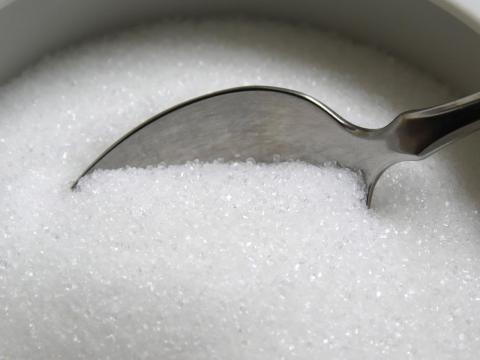Reactions: WHO advises against use of non-sweetened sweeteners for weight control
The WHO has issued a new guideline advising against the use of non-sweetened sweeteners for weight control or to reduce the risk of noncommunicable diseases. The recommendation is based on the findings of a systematic review published in 2022.

Fernando Rodríguez Artalejo - edulcorantes OMS
Fernando Rodríguez Artalejo
Professor of Preventive Medicine and Public Health at the Autonomous University of Madrid, researcher at CIBERESP and IMDEA-Nutrition
This WHO recommendation is the logical consequence of a systematic review of the scientific literature, published in 2022, which showed that sweeteners did not clearly help to control weight in the long term, but could increase the risk of diabetes, cardiovascular disease and mortality.
The WHO suggests that sweeteners should not be used to control weight or reduce the risk of non-communicable diseases, such as diabetes or cardiovascular disease. This is because the risks of sweeteners on chronic diseases are likely to outweigh their potential benefits on weight control (unproven or even contrary to expectations because in some studies they were associated with weight gain and more obesity). In practice, the WHO recommends reducing consumption or not consuming beverages (especially soft drinks) and foods (especially ultra-processed) containing sweeteners.
More studies are needed to evaluate the effects of replacing free sugars with sweeteners. However, since it is well known that free sugars (e.g., sugar added to soft drinks and some foods, or the sugar we add to coffee before drinking it) are not healthy and, moreover, new evidence suggests that sweeteners are not good in the long term, the recommendation is to reduce the consumption of both (sugar and sweeteners); in this way, food will taste less sweet. If someone wishes to have a sweet product, he/she can consume fruits or add fruits to the food, because their sugars are not bad (especially when the fruit is taken whole, with its fiber). On the other hand, the WHO recommendation does not apply to polyols (maltitol, sorbitol) that are used to sweeten some foods.
[The recommendation does not apply to people with diabetes] because the systematic review of the scientific literature on which the WHO recommendation is based did not include people with diabetes.
Rafael Urrialde de Andrés - edulcorantes OMS
Rafael Urrialde de Andrés
Professor at the Faculty of Biological Sciences of the Complutense University of Madrid and at the Faculty of Pharmacy of the San Pablo-CEU University, and member of the Board of Directors of the Spanish Society of Nutrition
The situation that is being generated implies that it would be necessary to analyze case by case, and not to generalize with all sweeteners, since, if the WHO suspects or has data on any undesirable effect of one or several sweeteners or additives, it would have to indicate to the JECFA (Joint WHO-FAO Committee that approves them) to immediately annul and revoke the approval of any sweetener or additive on which there are data that according to WHO may cause adverse health effects. The precautionary principle should be applied immediately, if it is not generating doubts that the rest of the Food Safety authorities do not have so far.
In the case of the European Union, EFSA is the authority that carries out and must continue to carry out the approval and the European Commission the authorization through Regulation 1333/2008. A fully effective system that guarantees, through scientific independence, food safety and consumer health protection implemented in the European Union since 2002, thanks to the separation of the approval of risk assessment (carried out by the food safety authority) and risk management (authorities such as the European Council, European Commission and European Parliament).
Currently EFSA and through EU legislation there are 19 authorized sweeteners, some of which have to include warning messages such as polyols (more than 10% added polyols: "excessive consumption may cause laxative effects") or aspartame ("contains a source of phenylalanine").
In the European Union sweeteners: xylitol, maltitol, lactitol, erythritol and sucralose also have approved health properties referring to the fact that the consumption of foods and beverages containing any of them instead of sugar causes a lower increase in blood glucose after ingestion compared to foods and beverages containing sugar or, also, they maintain the mineralization of teeth. In both cases, the energy content of foods and beverages should be reduced by at least 30%. In addition, in the case of xylitol, it has an approved disease risk reduction property, in which chewing gum sweetened with 100% xylitol has been shown to reduce dental plaque. A high dental plaque content is a risk factor in the development of caries in children (to be used under the condition that the consumer is informed that the beneficial effect is obtained with a minimum intake of 2-3 grams of chewing gum sweetened with 100% xylitol 3 times a day after meals).
However, and because of new advances and knowledge on intestinal microbiota, the effect of sweeteners and additives and other substances in general should also be evaluated, but not in isolation but present in the food matrix containing them, both in isolation and in combination.
Sweeteners are a tool for reducing added sugars and lowering the degree of sweetness as a result of the very low quantity that must be used to obtain the desired effect because they are intensive due to their high affinity to bind to the taste buds of the sweet taste. In addition, it is necessary to continue researching and approving sweeteners of natural origin such as Neosperidin DC (present in the albedo of oranges), thaumatin which is the protein present in the fruits of a tropical plant or steviol glycosides of stevia.
To achieve the effects for the reduction of overweight and obesity, the control on food and beverage intake should be on the total diet because otherwise with the behavioral effects of indulgence, balance or energetic reward the effect of foods and beverages with sweeteners may be null or even not have and be overridden by the rest of food intake. Excess sugar intake continues to be an alarming situation, in the case of the European Union, the European Food Safety has already warned about the foods and beverages that contribute most added and free sugars in the diet of citizens both in the adult population (table sugar or as a homemade ingredient, confectionery, sweets, sweetened drinks, juices and nectars) and in children (milk and sweetened dairy products).
Conflicts of interest: "From 1986 to 1992 I worked at the Faculty of Biological Sciences in the Chair of Plant Physiology as a collaborator and developing the work of my doctoral thesis. In 1991-1992 I worked as a Scientific Collaborator in the Plant Freezing Unit at the Cold Institute of the Spanish National Research Council (Consejo Superior de Investigaciones Científicas). From 1992 to 2000 I worked in a Consumers' Association, in the Spanish Consumers' Union and in the Revista de Consumo Ciudadano (edited by 5 consumer associations), where I was the Director of Food and Health and the Technical Director, respectively. From 2000 to 2006 I worked at Puleva as Director of Food Safety and Health. From 2006 to 2020 at Coca-Cola Iberia as Deputy Director of Scientific and Regulatory Affairs and later as Director of Nutrition and Health. Since 2020 I am Professor in different Faculties of different Universities: Faculty of Biology of the UCM, Faculty of Pharmacy of the USP CEU, Faculty of Nursing of the University of Valladolid and I collaborate in different masters in food, applied plant biology and food safety of the Faculty of Veterinary Medicine of the UCM, of the Faculties of the Campus of Health Sciences of the University of Barcelona, of the Faculty of Pharmacy of the University of Seville and of the Faculty of Pharmacy of the University of Granada. I am a Full Academician of the Royal European Academy of Doctors-RAED and member of its Governing Board and Honorary Academician of the Spanish Academy of Nutrition and Dietetics, President of the Scientific Committee of the Spanish Society of Sports Medicine and Member of the Board of Directors of the Spanish Society of Nutrition-SEÑ. I am also a member or partner of several scientific societies: Spanish Society of Food Safety-SESAL, Spanish Society of Community Nutrition-SENC, Spanish Academy of Nutrition and Dietetics-AEND, Spanish Society of Nutrition-SEÑ, Spanish Society of Sports Medicine and member of the Board of Trustees of the Spanish Nutrition Foundation-FEN. Since March 2020, I have no conflict of interest because I have no contractual relationship of any kind with any food company, neither in the food processing or distribution sector, nor with any pharmaceutical company. I have only collaborated with Consumer Associations and Scientific Societies or I am a member of the Scientific Advisory Committee in some information platforms".



